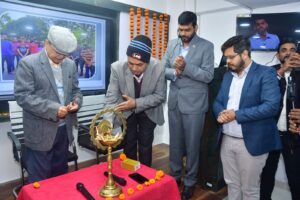
National Commission for Scheduled Tribes (NCST)
The National Commission for Scheduled Castes (NCSC), a constitutional body in India, embodies the nation’s commitment to ensuring the welfare and empowerment of the Scheduled Castes. It stands as a guardian of equity and inclusion, dedicated to uplifting the marginalized and underserved sections of society.
About the National Commission for Scheduled Castes (NCSC)
- The National Commission for the Scheduled Castes (NCSC) is a constitutional body in India.
- It has been established with a view to provide safeguards against the exploitation of the Scheduled Castes and Anglo-Indian Community as well as to protect their social, economic, educational, and cultural interests.
- The Headquarters of NCSC is in New Delhi.
Meaning of Scheduled Castes
- According to Article 366(24) of the Indian Constitution, “Scheduled Castes means such castes, races or tribes or parts of or groups within such castes, races or tribes as are deemed under Article 341 to be Scheduled Castes for the purposes of this Constitution.”
- Article 341(1) of the Indian Constitution says that “The President may with respect to any State or Union Territory, and where it is a State, after consultation with the Governor, by public notification, specify the castes, races or tribes which shall for the purpose of the Constitution be deemed to be Scheduled Castes in relation to that State or Union Territory, as the case may be”.
- Article 341(2) of the Indian Constitution says that “ Parliament may by law include in or exclude from the list of Scheduled Castes specified in a notification issued under the said Clause (1) any caste, race or tribe, but save as aforesaid notification issued under the said clause shall not be varied by any subsequent notification”.
- According to the 2011 Census:
- The Scheduled Castes represent 16.6% of the country’s population.
- The largest number of Scheduled Castes are found in Uttar Pradesh followed by West Bengal, and Tamil Nadu.
Evolution of the NCSC
The National Commission for Schedule Castes (NCSC), in its present form, has evolved through a series of developments as explained below:
Special Officer for SCs and STs
- Originally, Article 338 of the Indian Constitution provided for the appointment of a Special Officer for Scheduled Castes (SCs) and Scheduled Tribes (STs).
- The Special Officer was designated as the Commissioner for SCs and STs.
- The primary task of the Commissioner for SCs and STs was to investigate all matters relating to the constitutional safeguards for the SCs and STs and to report to the President on their workings.
65th Constitutional Amendment Act of 1990
- It amended Article 338 of the Indian Constitution and provided for the establishment of a high-level multi-member National Commission for SCs and STs.
- This constitutional body replaced the Commissioner for SCs and STs.
89th Constitutional Amendment Act of 2003
- It further amended Article 338 and inserted a new Article 338-A in the Constitution.
- As a result of this amendment, the National Commission for SCs and STs was bifurcated into two separate bodies:
- National Commission for Scheduled Castes (NCSC) – Article 338.
- National Commission for Scheduled Tribes (NCST) – Article 338-A.
Establishment of National Commission for SCs
- The separate National Commission for SCs was finally established in 2004.
Composition of NCSC
- It consists of a Chairperson, a Vice-Chairperson, and three other members.
- They are appointed by the President by warrant under his hand and seal.
- Their conditions of service and tenure of office are determined by the President.
Tenure of Members of NCSC
As per the National Commission for Scheduled Castes Chairperson, Vice Chairperson, and Members (Conditions of Service and Tenure) Rules of 2004:
- The Chairperson, the Vice-Chairperson, and other Members of the National Commission for SCs shall hold office for a term of three years from the date on which he/she assumes such office.
- The Chairperson, the Vice-Chairperson, and other Members shall not be eligible for appointment for more than two terms.
Functions of the NCSC
The major functions of the National Commission for SCs include:
- To investigate and monitor all matters relating to the constitutional and other legal safeguards for the Scheduled Castes and to evaluate their working.
- To inquire into specific complaints with respect to the deprivation of rights and safeguards of the Scheduled Castes.
- To participate and advise on the planning process of socio-economic development of the Scheduled Castes and to evaluate the progress of their development under the Union or a State.
- To present to the President, annually or at such other times as it may deem fit, reports upon the working of those safeguards.
- To make recommendations as to the measures that should be taken by the Union or a State for the effective implementation of those safeguards and other measures for the protection, welfare, and socio-economic development of the Scheduled Castes.
- To discharge such other functions in relation to the protection, welfare, development, and advancement of the Scheduled Castes as the President may specify.
Note:
- The Commission is also required to discharge similar functions with regard to the Anglo-Indian Community as it does with respect to the SCs.
- Till 2018, the Commission was also required to discharge similar functions with regard to the Other Backward Classes (OBCs). However, it was relieved from this responsibility by the 102nd Amendment Act of 2018.
Powers of the NCSC
- The Commission is vested with the power to regulate its own procedure.
- While investigating any matter or inquiring into any complaint, it has all the powers of a Civil Court, viz.
- Summoning and enforcing the attendance of any person from any part of India and examining him on oath,
- Requiring the discovery and production of any document,
- Receiving evidence on affidavits,
- Requisitioning any public record from any court or office,
- Issuing summons for the examination of witnesses and documents,
- Any other matter which the President may determine.
- The Central Government and the State Governments are required to consult the Commission on all major policy matters affecting the Scheduled Castes.
Report of the NCSC
- The Commission presents reports to the President annually or at such other times as it may deem fit.
- The President places all such reports before the Parliament, along with a memorandum explaining the action taken on the recommendations made by the Commission.
- The memorandum also contains the reasons for the non-acceptance of any of such recommendations.
- The President also forwards any report of the Commission pertaining to a State Government to the concerned State Governor.
- The Governor places it before the State Legislature, along with a memorandum explaining the action taken on the recommendations of the Commission.
- The memorandum also contains the reasons for the non-acceptance of any of such recommendations.
Critical Analysis
- Centre for Policy Research argues that NCSC suffers from multiple limitations due to various structural and other issues.
- First, the appointment procedure is not transparent and hence has become a retirement home of politicians.
- Second, neither the responsibility of promoting the welfare of the scheduled castes and tribes, nor that of protecting them against a variety of in justices has been vested exclusively in this institution.
- Third, despite the fact that it enjoyed constitutional status, the recommendations of the commission are advisory rather than mandatory.
- Parliamentary Committee on social justice and empowerment in its 2022 report submitted that NCSC and NCST both have become dysfunctional. In last 5 years, these bodies have not submitted a single report in parliament.
Conclusion:
The National Commission for Scheduled Castes (NCSC) stands as a cornerstone of India’s commitment to equity and social justice. By addressing grievances, ensuring constitutional safeguards, and promoting the socio-economic development of Scheduled Castes, the NCSC plays a vital role in empowering marginalized communities. However, for the commission to fulfill its mandate effectively, there is a need for greater transparency, accountability, and proactive measures in its functioning. Strengthening the NCSC’s capacity and ensuring the implementation of its recommendations can pave the way for a more inclusive and equitable society, aligning with India’s constitutional values and vision of social justice.
Preferred Questions on National Commission for Scheduled Castes (NCSC) for UPSC
GS Paper II (Governance, Constitution, Polity):
- Explain the constitutional provisions related to the National Commission for Scheduled Castes (NCSC) under Article 338.
- Discuss the impact of the 65th and 89th Constitutional Amendments on the evolution of the NCSC.
- Analyze the role of NCSC in ensuring the implementation of constitutional safeguards for Scheduled Castes.
- How does the NCSC address issues of exploitation and discrimination faced by Scheduled Castes in India?
- Critically evaluate the effectiveness of NCSC’s annual reports in influencing government policies.
GS Paper I (Indian Society):
- Examine the significance of the NCSC in promoting social justice and inclusivity in Indian society.
- Discuss the socio-economic challenges faced by Scheduled Castes despite constitutional and legal safeguards.
- How does caste-based discrimination affect the socio-economic development of Scheduled Castes in India?
- Analyze the role of NCSC in addressing caste-based inequities and uplifting marginalized communities.
GS Paper IV (Ethics, Integrity, and Aptitude):
- What are the ethical implications of ensuring equitable representation for Scheduled Castes through the NCSC?
- Discuss the ethical challenges in balancing affirmative action with meritocracy in the context of Scheduled Castes.
- Evaluate the transparency and accountability mechanisms in the appointment and functioning of NCSC members.
- How can the NCSC uphold ethical governance while addressing the grievances of marginalized communities?




